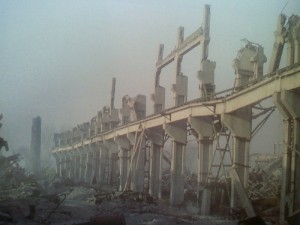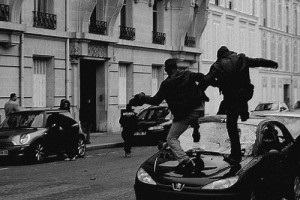On September 13, 1999, at the power station at Tokaimura on the Pacific coast of Japan, the most serious nuclear accident since the time of Chernobyl took place. During a laboratory experiment, three technicians spilled sixteen kilograms of uranium into a sedimentation tank designed to hold little more than two. The error started a chain reaction that continued for many hours, contaminating the entire area surrounding the station for a radius of several kilometers.
Continue reading (en/fr)-The End of the World by Mare Almani (Diavolo in Corpo)
Tag Archives: diavolo in corpo
The Camps Under the Heavens by Adonide (Diavolo In Corpo)
The tradition of the oppressed teaches us
that the state of exception in which we live is the rule.
We must achieve a concept of history that corresponds to this fact.
—Walter Benjamin
The concept of Rights is a huge apparatus that creates exclusion, that is based on exclusion, and yet the chorus of protest against every sort of exclusion merely demands rights, hoping that the heaven of Rights extends itself to newer and newer lands. In fact, democracy is conceived as this progressive conquest of newer and newer spaces. This is why it is not only defended, but also exported. The of legal acknowledgements must cover more of the possibilities and aspirations of individuals every day. An individual who has his rights is a citizen, which is to say a being who has the right of citizenship in the democratic City.
With the most varied intentions, many are waiting for a renewal of democracy.
Continue reading The Camps Under the Heavens by Adonide (Diavolo In Corpo)
On Behalf of the Barbarians by Bleu Marin
If I don’t know the meaning of a language, I will be a barbarian to the one who speaks it, and the one who speaks will be a barbarian to me -.Paul, First Corinthians
Continue reading On Behalf of the Barbarians by Bleu Marin
Nature, C’est Moi by R. D. B.
Money and Logos By M. D. P. (Diavolo In Corpo)
Is there a relationship between the birth of the rational mentality and the development of commercial economy? In the 7th century B.C.E., a whole series of tightly connected social changes took place in the Ionian Greek cities of Asia Minor. It is precisely during this epoch that the rational mentality arose, at the time when maritime commercial culture began to experience its first great development.
Continue reading Money and Logos By M. D. P. (Diavolo In Corpo)
For the Poetry of Life by L. Vargas (Diavolo In Corpo)
How many people have gone through life without ever waking up!
And how many others have been noticed who live only for the monotonous tick-tock of the clock!
Continue reading For the Poetry of Life by L. Vargas (Diavolo In Corpo)
Elsewhere by H.T. (Diavolo In Corpo)
“Real life is absent. We are not in the world.”—A. Rimbaud
Continue reading Elsewhere by H.T. (Diavolo In Corpo)
Eight Hours Too Many? by E. Kerr (Diavolo In Corpo)
Work less to live more. What a beautiful slogan! I wonder if the one who coined it understood the unintended truth it contains, that work is the negation of life. “Eight hours of obligation is enough to exhaust a person’s energy. What he gives at work is his life, the better part of her strength. Even if the work has not degraded her, even if she has not felt himself overcome by boredom and fatigue, he leaves exhausted, diminished, with the imagination withered.” So a worker wrote several decades ago. Anyone who has worked even for just one day understands the meaning of these words. This is why the reduction of work hours has always been one of the primary demands of those who don’t commission the work, but who carry it out, and so bear its entire burden.
Continue reading Eight Hours Too Many? by E. Kerr (Diavolo In Corpo)
Demands by A. G. C. (Diavolo In Corpo)
“What do you want, my children? Jobs? Regional autonomy? A pay raise? The vote at the age of 15? Retirement at the age of 45? Equality of the sexes? Keep on asking in order and all of your complaints will be properly treated with the due form.”
Continue reading Demands by A. G. C. (Diavolo In Corpo)
But Which History Is This? by Adreba Solneman
History is a progression toward the origin. Every new beginning in reality transforms all known time. But history is also one: plurality is now a moral slogan, like tolerance. The historians who recount it, who comment on it, who analyze it, obscure its visibility: history is the past! So no one will think of making use of it to transform the present.
Continue reading But Which History Is This? by Adreba Solneman









